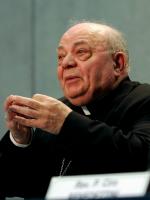|
Issue Date: March 26, 2004
Artificial hydration, feeding: normal or extraordinary care? By ARTHUR JONES A statement circulating for signatures among U.S Catholic health care ethicists forcefully disagrees with a Vatican official’s March 16 opinion that artificial hydration and nutrition for patients in a “persistent vegetative state” is “simply care,” and not medical intervention.
Bishop Elio Sgreccia, vice president of the Pontifical Academy for Life, made the claim at a news conference prior to the March 17-20 congress of the World Federation of Catholic Medical Associations, a gathering of 350 physicians and medical ethicists in Rome. The view advanced by Sgreccia is “irresponsible” and flies in the face of “the many statements to the contrary offered by medical societies, individual bishops and conferences of bishops,” said the U.S. statement, written by Dominican Fr. Kevin O’Rourke, professor at the Neiswanger Institute of Ethics and Public Policy and the Stritch School of Medicine at Loyola University, Chicago. His statement was prepared prior to a Las Vegas meeting of Catholic Health Association ethicists March 24-26.
The Rome congress on “Life-Sustaining Treatments and the Vegetative State: Scientific Advances and Ethical Dilemmas,” however, echoed Sgreccia’s stance on its opening day when Eugene F. Diamond, director of the Catholic Medical Association’s Linacre Institute, also said that the provision of nutrition and hydration through tubes was not “extraordinary” intervention but obligatory care. The Sgreccia-Diamond viewpoint is not one that would be accepted by a significant majority of U.S. Catholic ethicists, James J. Walter, O’Malley professor of bioethics at Loyola Marymount University, Los Angeles, told NCR. “We normally understand ‘care,’ ” he said, “to mean washing the patient’s body, turning the patient so they don’t get decubidi [bedsores], things of that sort, and you could include providing a tray of food to a patient. “But when you start artificially delivering this,” said Walter, “it is now a matter of treatment. And I think that’s been the point with many Catholic ethicists from the beginning: that this is artificially delivered.” Walter considers the Sgreccia-Diamond view “an attempt to reshuffle the deck with the artificial hydration-nutrition and put it into another category, to pull things back.” He said he suspects that the Schiavo case in Florida has provoked anew this latest examination because the family is Catholic, because politicians have become involved, and “possibly someone from that area has written to Rome wanting a clarification.” Terri Schiavo has been in a persistent vegetative state since suffering heart failure in 1990 when she was 26. Her husband, Michael Schiavo, said his wife would not want to be kept alive in this state. Her parents, Bob and Mary Schindler, insist their daughter responds to them and could improve. It took action by the Florida state legislature and an order from Florida Gov. Jeb Bush to have Schiavo’s withdrawn feeding tube reinserted in October 2003. As if in anticipation of the Rome gathering, the Catholic Health Association organized a March 10 members’ audio conference on Schiavo and artificial nutrition and hydration in Catholic hospitals. Walter said there are inconsistencies in the current “Ethical and Religious Directives for Catholic Health Care Services.” In fact, he said, “they probably establish two different standards. The introduction to Part 5 said AHN [artificial delivery] could be discontinued if the patient is imminently dying or if the patient cannot assimilate the nutrition and hydration. Article 58 says there’s a presumption to favor providing nutrition and hydration, and decisions to withdraw that can be done on the basis that there’s not sufficient benefit to outweigh the burdens to the patient.” Walter’s expectation is that “the Pontifical Academy for Life is likely to go in the direction of the most conservative, protective interpretation of the traditional ordinary/extraordinary means.” (The “ordinary” means “care” that offers some hope of benefit and no excessive burden; “extraordinary” does not offer hope of benefit or imposes an excessive burden.) The O’Rourke statement “observations” on Sgreccia’s remarks included:
O’Rourke, who said this has been an ongoing dispute since the beginning of the 1990s, told NCR this was a Vatican effort to “ ‘close the door.’ But there are enough statements from U.S. bishops to make the Vatican hesitant, he said, including one by 13 Texas bishops in favor of the idea that artificial hydration and nutrition can be removed, and a recently issued statement by Illinois bishops that allows for AHN withdrawal when it is not beneficial for the patient.” The issue, he said, also comes down to the fact that the rulings by groups such as the Texas and Illinois bishops “are appreciated by people who’ve worked in the hospitals wards. To my mind there are people, and Bishop Sgreccia is one of them, who haven’t worked in hospitals wards with the people, the lay people who have to make these decisions.” Sources for this article included NCR’s Rome bureau and Catholic News Service. Arthur Jones is NCR editor at large. His e-mail address is arthurjones@comcast.net.
National Catholic Reporter, March 26, 2004 |
 U.S. ethicists counter Vatican view
U.S. ethicists counter Vatican view